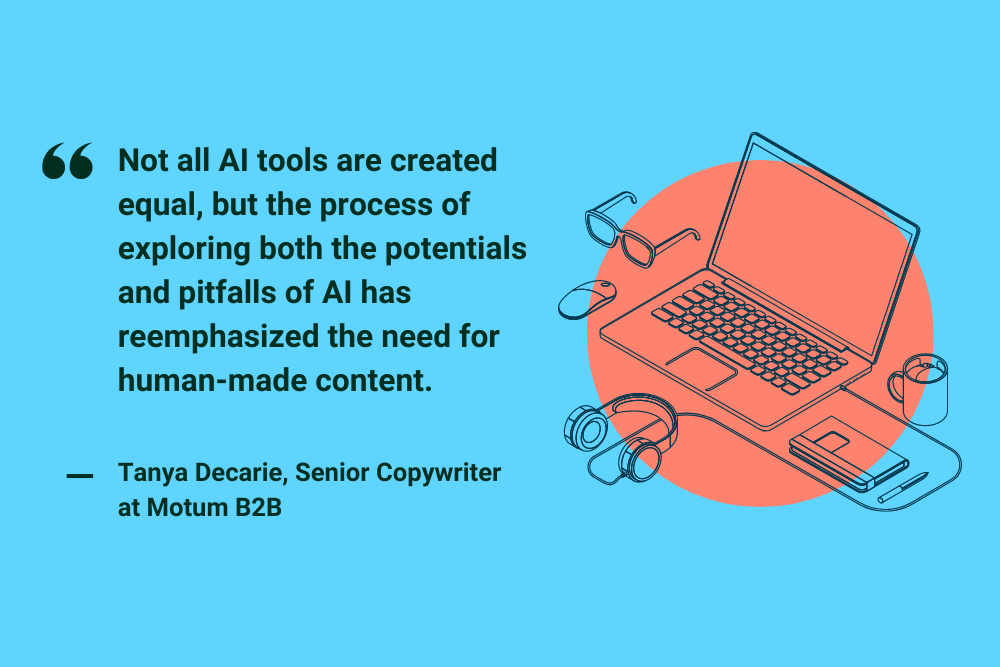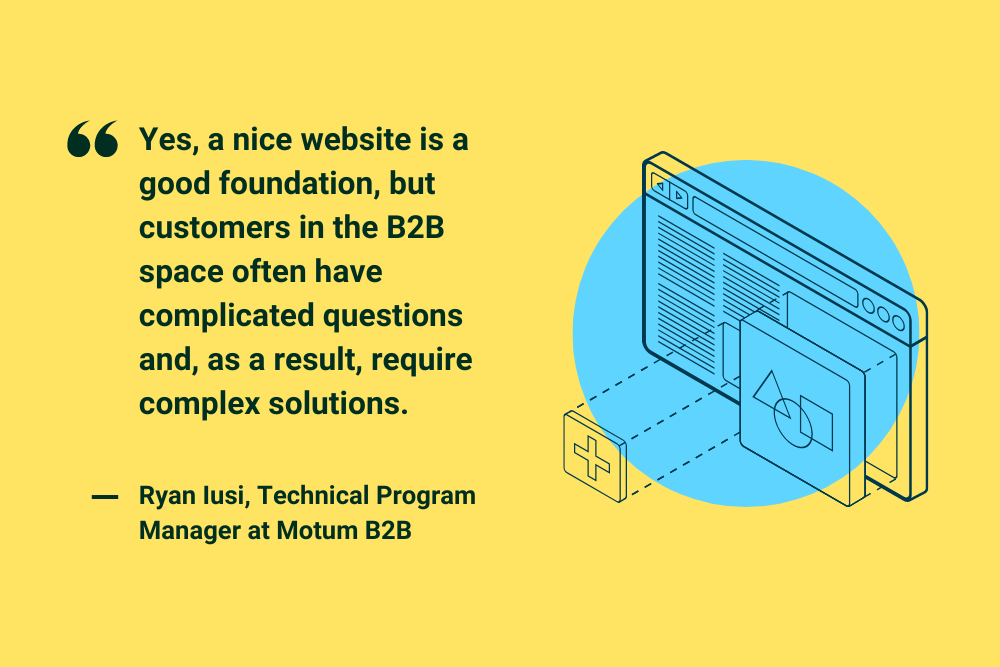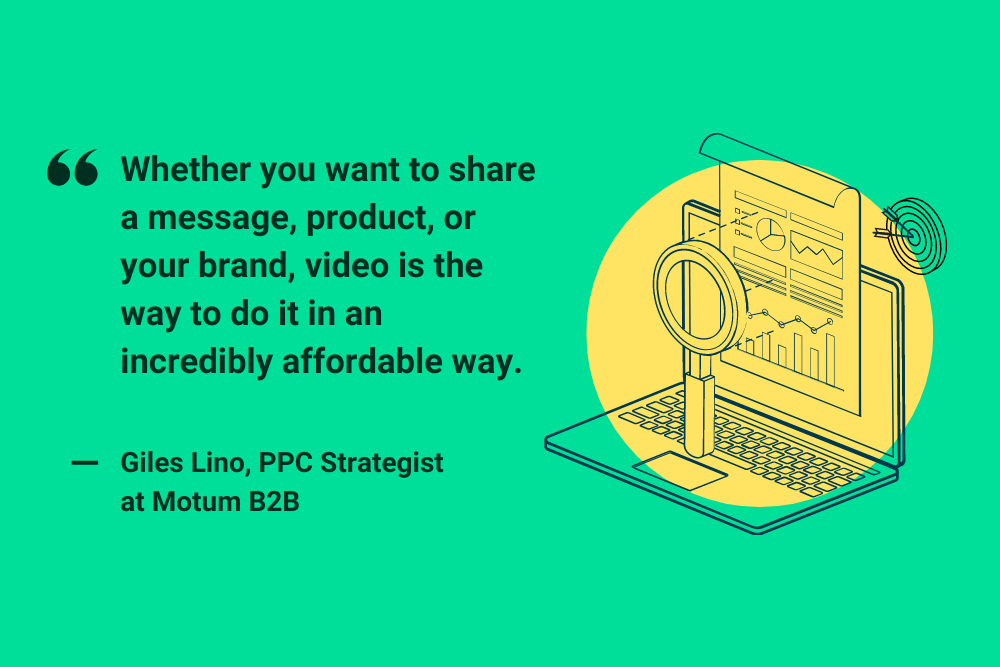How did the B2B industry change in 2023?
From AI’s impact on SEO to shifts in the way teams collaborate, these are the biggest changes the Motum B2B team saw this year.

With experts spanning design, content, websites, and analytics and engagement, we like to think we’ve got a holistic view of what’s happening in the B2B industry.
To mark the end of the year, we sat down with experts across those departments to get an insight into what they felt defined 2023, and what you should be looking out for in 2024.
SEO | Brandon Gilmore, SEO Manager
“2023 has been a year of change for SEO but also a lot remained the same. This year, we saw AI being integrated into workflows and processes, unlocking new ways of researching topics and keywords.
Google confirmed this year that the switch to mobile-first search is complete. This has been underway for several years now and supports our work making responsive websites and auditing websites to ensure they are mobile friendly and provide great UX. Google also had to release insights into how search works and there’s no surprises there.
There’s no magic bullet when it comes to SEO. Search engine rankings are a combination of hundreds of factors (backlinks not being one of the top three) and it is important to experiment to get in front of your audience.
In 2024, it’s important to continue providing a great user experience and answer queries with your content. Provide helpful content that demonstrates your brand's experience and expertise to convert (on-site and in search engines) and educate your audience.”

Content | Tanya Decarie, Senior Copywriter
“I asked ChatGPT to give me the most noteworthy change in the B2B industry this year. This was part of its response:
‘In 2023, the B2B industry experienced a remarkable integration of artificial intelligence (AI) into marketing strategies, revolutionizing customer interactions and data-driven decision-making.’
The rest of its answer was equally bland and self-aggrandizing, using words like “pivotal shift” and “new standard for innovation” with the confidence of a 2007 Wall Street trader. When I followed up by asking whether this information was true, it reminded me that its last knowledge update was done in January 2023, and therefore it couldn’t verify the accuracy of its previous statement.
I do agree that AI has had a big impact on the B2B industry, but not in the way this chatbot says. Not all AI tools are created equal, but the process of exploring both the potentials and pitfalls of AI has reemphasized the need for human-made content — content that is researched, verified, designed, and written by humans.
Because our readers are people, after all, and B2B content creators are better equipped than any robot to understand their real-life perspectives, pain points, and goals. AI is just a reminder that we need to write with them in mind.
If you have the opportunity to inject a bit of human personality and humour, even better. ChatGPT’s writing is boring and long-winded. That’s not how B2B needs to be!”

Web | Ryan Iusi, Technical Program Manager
“This year’s seen the rise of a range of trends and tools, including AI and large language models (LMM), which have presented opportunities but also risks to our clients. Notion has also been a specific tool that’s made our web strategy documentation process a lot smoother.
Otherwise, I'm seeing the need for bespoke business tools or interactives as being more important in the current online landscape.
Yes, a nice website is a good foundation, but customers in the B2B space often have complicated questions and, as a result, require complex solutions. Building out customer focused tools such as calculators, product visualizers, and configuration tools help answer those questions ahead of time and generate more qualified leads for our clients.
I also feel many B2B companies could put more effort into leveraging social media. How much of an impact social could actually make for some of our clients might be debatable, but we won't know unless we try. I don't think expectations for social engagement should be the same as B2C, but we live in a world where most working professionals, including client customers that may be engineers, builders, or contractors, do have social media accounts, and actively engage with brands, customers, and clients.”
Branding & Strategy | Jeanette Thompson, Marketing and Brand Strategist
“Collaboration is the number one shift in how marketing teams can deliver on brand assets quickly. According to Figma, 76% of designers are using collaborative design tools more often. To execute quickly, you need to leverage tools that allow everyone access to the work, provide feedback quickly, and even enable team members outside the creative department to do more of the work.
Programs like Figma and Canva are powering teams to better collaborate on design implementation, and there’s a desire to shift away from proprietary software. This requires a strong set of brand guidelines and clear creative direction so teams can feel empowered as brand stewards. It also requires investment to develop branded assets that can be leveraged by team members outside of the creative department.
The power of AI and design automation is growing quickly, and it's evident in software platforms like Photoshop. The software is constantly upgrading to include more tools that leverage AI in the design process.
Brand narrative is also more important than ever, and B2B companies that understand why now is the time to invest in getting this right will gain a competitive edge as the lines between B2B and B2C shift with younger audiences.”

PPC | Giles Lino, PPC Strategist
“AI isn’t taking over just yet.
Generative AI has shaken up the marketing world and there have been calls to ‘embrace the change’ or risk getting left behind. With Google and Microsoft looking to reshape the search experience with generative AI, PPC is going to experience a shakeup, too.
The challenge is we’re dealing with a lot of speculation on what that change will look like. As a result, your best defense is a good offense. Learn as much about AI as possible and use it as a tool, not a solution, because no matter how expansive AI gets, people will still want to feel like they’re talking to an actual person.
Also, are you doing video yet?
It’s an idea that’s sounding like a broken record but if you aren’t doing video… start planning to make a video. Not only have video formats expanded with platforms like TikTok and Instagram, but YouTube is one of the most powerful platforms out there. Whether you want to share a message, product, or your brand, video is the way to do it in an incredibly affordable way. Explore formats, styles, and messaging to get your brand out there.”
Analytics | Steve Lendt, Director, Engagement & Analytics
“This year, some of the topics we’ve been tackling at the CMA B2B council include the importance of creativity in B2B marketing, B2B marketing talent, the maturation of digital marketing, and demystifying account-based marketing (ABM).
While all of these are important and have defined the B2B landscape throughout 2023, I’ve been looking at them through the lens of a recent LinkedIn B2B Institute session focused on the idea of brand as a promise that’s made to customers.
It’s shaped the way we look at our paid media marketing exercises and acts as a solid framework that I plan to learn more about and use as we start thinking about the next year.”
What's on your list for next year?
Whether it’s creating SEO content that provides customers value by answering their queries, rethinking the way your team collaborates to deliver brand assets, or leaning into human-made content, we hope the above empowers your B2B team to hit the ground running as we start 2024. Here's to another great year!